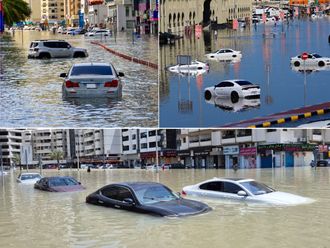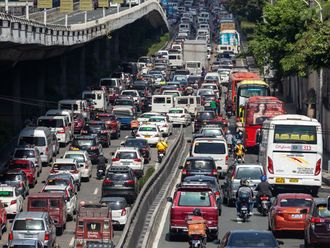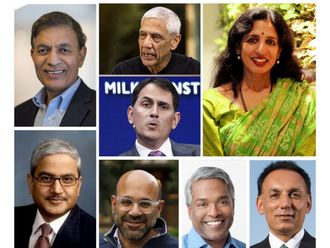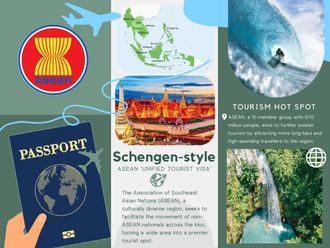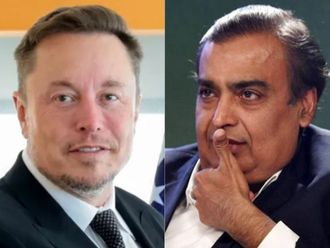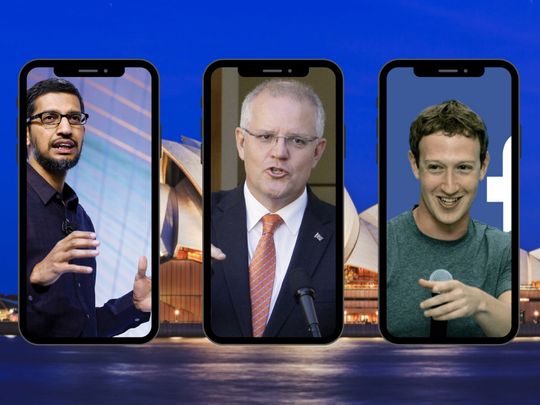
Highlights
- Facebook took down a huge number of Australian Facebook pages, in addition to news pages, on Thursday.
- It's the latest skirmish in the long-drawn battle over a news revenue-sharing law proposed under the present government.
- Facebook lawyers are fighting a new legislation aimed to address a power imbalance between the social media giants and Australian publishers.
- Facebook's massive retaliation on Thursday was derided by the Australian Prime Minister and other key officials.
DUBAI: On Thursday, February 18, 2021, Australian news sites went dark. News feeds on the Facebook wall of millions of Austalians kicked up blank pages. The FB walls of media companies turned empty. The reason: Facebook tried to block all Australia-related news content in one go.
Along with the news, however, Facebook also blocked health pages, emergency safety warnings and welfare networks from the site. The move stunned many. It also marks an extraordinary escalation of a dispute with the government over payment for content. Australia is not first country with plans to compel Google and Facebook — also referred to as "Big Tech", together worth $3 trillion — to share their revenues with content creators. Understandably, their lawyers had been fighting moves to compel them to pay licensing fees for content, especially news, used on their platforms.
Here's the lowdown on the showdown:
What happened?
Changes made by Facebook on Thursday shredded the pages operated by news outlets and removed posts by individual users sharing Australian news. For example, the Facebook pages of Nine and News Corp, which dominate Australia's metro newspaper market, and the government-funded ABC, which acts as a central information source during natural disasters, went blank. Other developments:
- Several major state government Facebook accounts were affected.
- These included those providing advice on the coronavirus pandemic and bushfire threats.
- Scores of charity and non-governmental organisation accounts also went blank.
Who are the so-called 'Big Tech'?
Google and Facebook, in this case.
Why are they called 'big'?
They're industry titans whose influence touches almost all corners of the planet. Alphabet, the parent company of Google, has a market value of $2.12 trillion, while Facebook has a market cap of $780 billion as of February 17, 2021. Together, these two companies have a combined market valuation of nearly $3 trillion. By comparison, Russia posted a GDP of $1.7 trillion (2019).
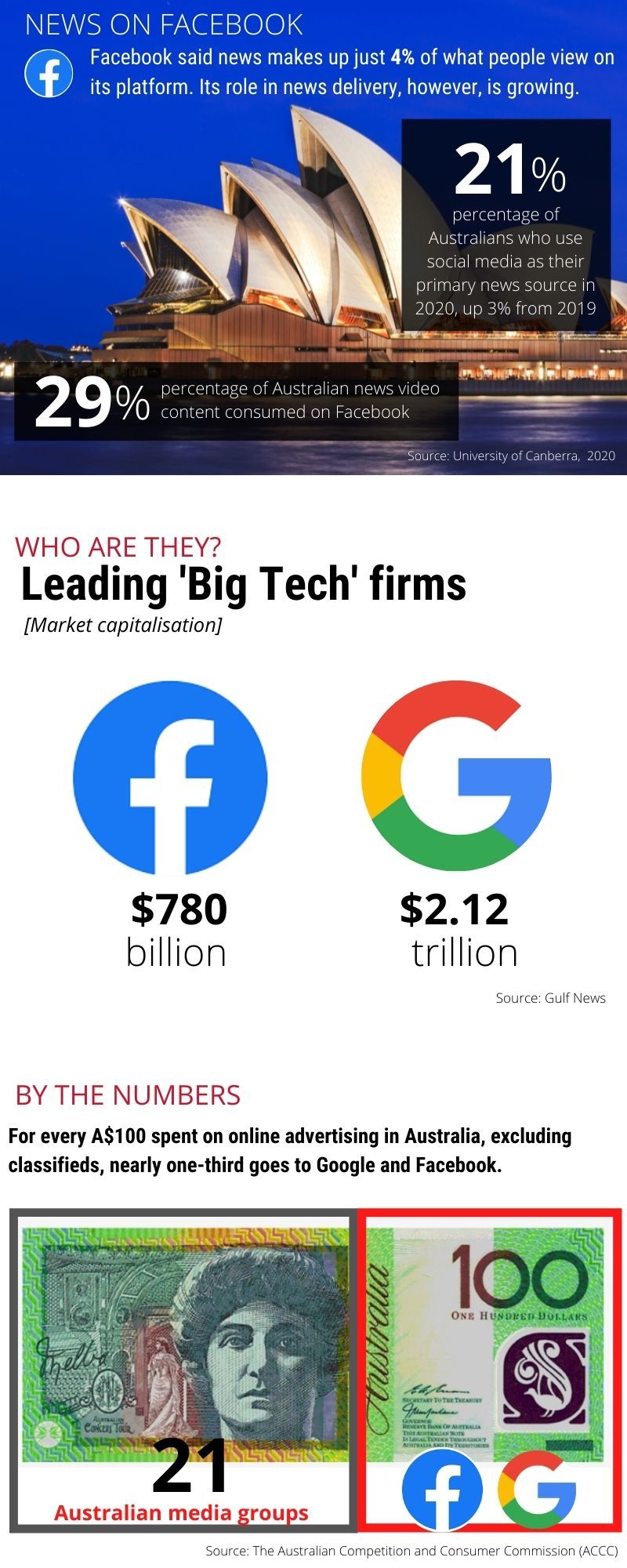
What's Facebook's move all about?
It's a fight over money. Specifically, it's about a news revenue-sharing law about to be passed by Australia's legislators. Canberra's new code represents the most expansive reform — and the world is watching. It's not just Australia, but the battle is a spillover one. Other countries may follow suit. Media outlets and Big Tech have also battled over the right to news content in other jurisdictions. In 2018, the EU passed a similar legislation.
What is the new Australian law that Facebook and Google are up against?
It's known as the "Media Bargaining Code". The proposed legislation is aimed to address a power imbalance between the social media giants and publishers when negotiating payment for news content used on the tech firms' sites. The bill was put forward by the government and the country's competition regulator, the Australian Competition and Consumer Commission (ACCC).
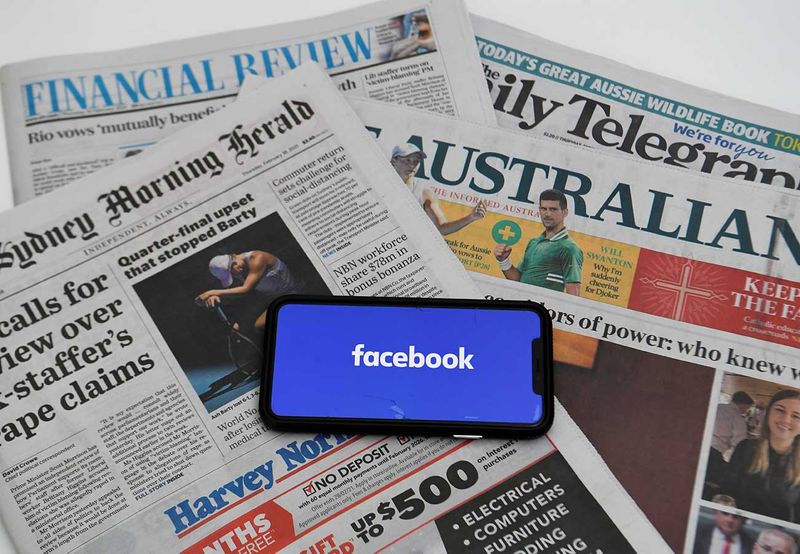
Is Australia the first country to compel Big Tech to pay for news?
No. Media outlets in other jurisdictions and Big Tech have also battled over rights to news content. The Australian saga is just the latest in the raging battle over ad revenue sharing in the digital. In 2018, the EU passed a similar legislation. As expected, the tech giants fought tooth and nail against the legislation.
What did the EU law mandate?
It's more or less the same as Australia's. It required the tech giants to enter into negotiations with publishers when linking to their digital material. France led the way. It imposed the new rules within its borders. Initially, Google refused to pay French media. After a bitter battle, French publishers and Google eventually agreed to a three-year deal worth a reported €62 ($75 million), according to a Reuters report.
$ 75 million
Worth of three-year deal between French publishers and Google, as reported by Reuters.What does the code prescribe?
These are the main points of the proposed legislation:
- Under the proposed code, news outlets will be required to negotiate commercial deals individually or collectively with Facebook and Google. If they cannot reach an agreement, an arbitrator will decide whose offer is more reasonable.
- The law also requires that the tech firms give media outlets notice when they change search algorithms in a way affecting the order in which content appears.
- The new legislation would also compel Big Tech to share their use of consumer data extracted from news content on their sites.
When does the code kick in?
It's not yet a law. But the proposed legislation has widespread support in the Australian parliament, where it is expected to be voted into law "within days", according to Reuters.
What if Facebook or Google break the resulting agreements?
Under the proposed legislation, they can be fined up to A$10 million ($7.4 million) in civil penalties.
Will it also affect other tech firms?
The regulator that advised the Australian government on the legislation has said it's likely other tech firms will be added, though the proposed legislation will immediately apply to Facebook and Google.
What are the key differences between European and Australian legislations on ad revenue sharing with Big Tech?
These are at least two key differences:
- Australia has used competition law to draft the Media Bargaining Code
- This is much more effective than the copyright legislation being used in other jurisdictions, including the EU.
Why has the dispute escalated?
Traditional media companies operating in Australia have suffered huge hits to income streams, due to dwindling subscriptions and advertising. For every A$100 spent on online advertising in Australia, excluding classifieds, nearly one-third goes to Google and Facebook, the competition regulator has said.
What were the media sites that were blocked by Facebook in Australia?
International outlets like:
- Content of 21 Australian media groups
- Reuters
- The New York Times
- BBC
- Wall Street Journal
What did Facebook say?
A Facebook official said it had no choice but to implement the news block.
The proposed law fundamentally misunderstands the relationship between our platform and publishers who use it to share news content. It has left us facing a stark choice: attempt to comply with a law that ignores the realities of this relationship, or stop allowing news content on our services in Australia. With a heavy heart, we are choosing the latter."
Facebook also stated its platform generates billions of free referrals to Australian publishers worth significant sums to the media companies. A Facebook spokesperson also said official government pages "should not be impacted by today's announcement" and the company "will reverse any pages that are inadvertently impacted".
The statement said: "As the law does not provide clear guidance on the definition of news content, we have taken a broad definition." Facebook's own page was down for several hours in Australia before being restored, Reuters reported.
What did Google say or do about the new Australian code?
Google, owned by Alphabet Inc, has initially threatened to withdraw its main search engine from Australia if the code go ahead. Google later backed down from making good its threat and has instead struck deals with some of the country's major commercial publishers.
Are Facebook and Google on the same page with the Australian government's move?
No. Facebook's dramatic move represents a split from Google. For years, they joined together to campaign against the laws they deemed would eat into their ad revenues. Both had threatened to cancel services in Australia. Recently, however, Google has sealed preemptive strike, signing deals with several outlets.
• Australia's two largest free-to-air television broadcasters have struck deals collectively worth A$60 million ($47 million) a year, according to media reports.
• That dwarfs the $76 million Google will split between 121 publishers in France over three years, which averages $209,000 a year per publisher, as reported by Reuters.
What's the deal between Google and NewsCorp?
The Murdoch-owned NewsCorp conglomerate, reached a three-year licensing agreement that will see the Google pay the company for its content, including through online advertising, digital subscriptions and via YouTube. News Corp stated that it will receive "significant payments" from Google in return for providing content for the search engine's News Showcase account. An advertisement on News Corp's main Australian news site said, "You don't need Facebook to get your news", alongside a link to the company's smartphone app.
What was the reaction of Australians to the blackout?
The blackout of legitimate information sources appeared to some to expose the hollowness of Facebook’s prior claims that it was unable to suppress hate speech or pages spreading dangerous misinformation — as well as its failure to respond to reports of abuse.
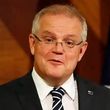
Facebook's actions to unfriend Australia today, cutting off essential information services on health and emergency services, were as arrogant as they were disappointing.
"This is an alarming and dangerous turn of events," said Human Rights Watch in a statement. "Cutting off access to vital information to an entire country in the dead of the night is unconscionable."
Communications Minister Paul Fletcher said Facebook needed to think "very carefully" about blocking the pages of organisations that employ professional journalists with editorial policies and fact-checking processes in place. Fletcher told public broadcaster ABC:

They're effectively saying any information that is available on our site does not come from these reliable sources," "I would imagine that on quite sober reflection, they will start to become quite troubled about what that would mean for how their platform is perceived.
Australian media, however, reported that several Facebook pages that regularly promote misinformation and conspiracy theories were unaffected by the ban.
Did Facebook eventually restore some of the pages?
Yes. By mid-afternoon on Thursday, many government-backed Facebook pages were restored. Several charity pages and all media sites, however, remained dark, according to Reuters.
Has Australia done this (fight with big companies) before?
Yes. Australia has previously engaged in lengthy battles with major corporations. In 2012, the then centre-left government became the first in the world to prohibit cigarette companies from using designs on their packaging to attract consumers. Big Tobacco companies mounted legal challenges but the courts ultimately upheld the law.
Will other countries follow the EU and Australian moves over ad revenue sharing?
It's not clear at this point, but there's an expectation others may follow suit.
COMMENT:
I’m not on Facebook anyways
Yousra Zaki, Senior Features Editor
Facebook has decided to block both Australian users and media companies from news articles on their wall. If this were to spread to the rest of the world, I doubt anything would change in my life, personally. I know a lot of boomers are on Facebook these days, which has automatically made it very unpopular with the younger generation. I was once on Facebook. Tagging my friends in photos, writing public messages on my best friend’s wall, and getting all my information from there.
Yousra Zaki
At some point maybe around five years ago, I just found myself uploading less, commenting less, eventually checking less and less. These days, I have absolutely no reason to check Facebook. If I HAVE to, I will check Facebook for work.
I get my news from Twitter mostly and I also see occasional lighter pieces of news on Instagram. These days, even TikTiok has picked up on some news, so I think I am covered. Definitely won’t be in the slightest bit affected that I can’t get my news on Facebook. In fact, I believe that the more countries move to block news from being posted on Facebook, it would cause a severe decrease in fake news and will finally stop random people in my friend groups from sharing an article I don’t care about.
Facebook has never been a source of news for me
Shyam A. Krishna, Senior Associate Editor
Shyam A. Krishna
What if the rest of the countries follow Australia’s suit? Will it affect me and my access to news. No, not really. For, I access Facebook only to keep in touch with friends and relatives. Which mean I access news sites through Facebook sparingly. That’s to say, if I find an interesting post from a news portal, I will click on it. So I won’t be impacted if Facebook’s ban extended to other parts of the world.
I access news websites mainly through newsletters and apps. It takes care of the bulk of my daily news diet. Facebook doesn’t figure in my quest for news. I would be impacted if Google were to follow in Facebook’s footsteps. Because I use Google for research, hence it would affect my work. But I’m not worried since there are many other search engines and sources of information.
I firmly back the Australian government’s move simply because the tech majors have eaten into newspaper revenues. And they use content generated by news organisations to rake in profits. This has had a drastic effect on newspapers which are struggling from dwindling ad revenues. And in the resultant restructuring, many of our friends and colleagues have lost their livelihood. So it’s time the social media giants paid a share of their revenues to newspapers.
Facebook, I won’t miss it. I hardly post these days. It’s just a matter of time before I delete my account.
Eye witness: The ravaging of the news media
By Jay Hilotin, Senior Assistant Editor
The busines of news, and content in general, has changed forever. The digital revolution has left nearly nothing untouched on earth. The dynamics involved in content creation, however, more or less remained the same. It takes planning, effort and commitment to generate a compelling one. How do we make sense of the ravaging of the news media? Consider these:
- People consume content that's useful to them, or satisfies their needs.
- There's a price to pay for doing this job and turning content into something understandable.
- Whether content is produced by independent organisations or by tech giants, someone has to pay the price.
- Digital tech has changed the world, but the redeeming values of news — truthfulness, verification — have not changed.
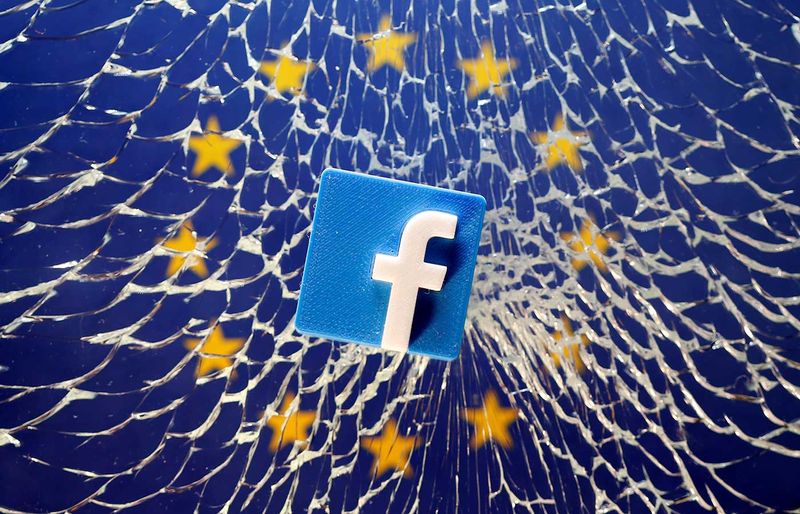
Content distribution may have changed, too, but the fundamental messaging did not. The content ecosystem has changed, thanks to digital media, but the basics of content creation society relies upon for its proper functioning remain the same. People consume content — news articles, audio, video, blog posts, case studies, e-books, e-courses, infographics — and not technology per se. People are naturally drawn to content they take delight in. And where eyeballs go, advertisers go.
Today, content creators and providers are left out in the cold in this long-drawn digital party, where tech behemoths have made the world their stomping ground. FB and Google have eaten up everyone, taking the lion's share of the action. The question is: Is this "business model" sustainable, or fair?
Legislators in Europe and Australia have slammed the breaks — finally — declaring it's not. Some retaliation from the giants is expected. Like what Facebook did in Australia on Thursday. But finally, what content providers lack in technology, they increasingly have enough in law. There's a growing realisation: truth does not belong to the one who shouts the loudest. And core values of society cannot be left to a business whose core competency is money-making algorithmic manipulation.




